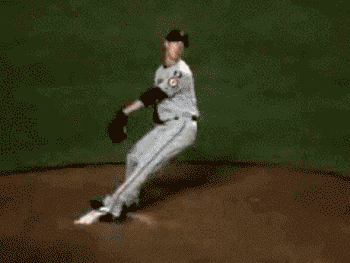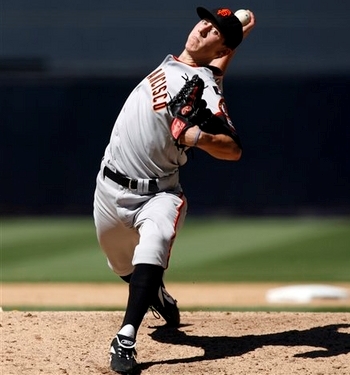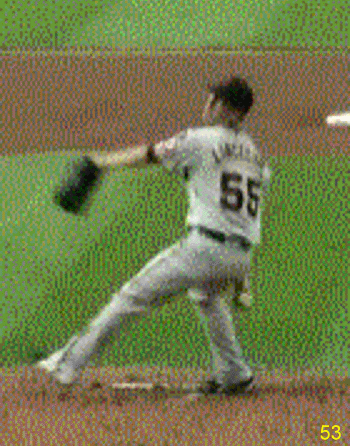Pitching Mechanics Analysis
Tim Lincecum
2007.12.12
Updated 2010.9.1
As I discuss in more detail lower down on the page, for a
few years I have been concerned about the long-term health of
Tim Lincecum's arm. I believe that these concerns are related to
the struggles that Tim Lincecum has experienced lately. The
problem is that Tim Lincecum has an
Inverted L in his arm action, and a timing problem as a
result, as the
video clip below demonstrates.

Tim Lincecum
The Inverted L is clearly visible in Frame 25. Notice how he
picks his Pitching Arm Side (PAS) elbow straight up out of the
plunged, ball by the PAS hip position. The problem is that this creates a timing
problem. In Frame 26, when Tim Lincecum's Glove Side (GS) foot
plants, his pitching arm is late and isn't close to vertical.
This causes his PAS upper arm to externally rotate 100 or more
degrees by Frame 27, which puts a lot of strain on both the
elbow and the shoulder.
2008.12.1 Update
Tim Lincecum's lower body mechanics are extremely efficient,
which is why such a relatively small guy can throw as hard as he
does. However, his delivery is a little max effort, his arm
action is
borderline, and he shows signs of a timing problem, which is why I don't rate him
as highly as I do Justin Verlander
or Cliff Lee.
Let's Go to the Tape
I recently came across some super slow motion video of Tim
Lincecum that makes clear some of the things I think he does
well, but also makes me more concerned about the long-term
health of his arm.
Let me explain why I say that.

Tim Lincecum
In Frame 18 you can see how Tim Lincecum does three things
that are good. First, he drives off the rubber toward the plate
with his Pitching Arm Side (PAS) leg. Second, he sweeps his leg
out toward Third Base and into foot plant, which is something
that great pitchers like
Greg Maddux do and I prefer to a more
linear stride like Mark Prior's. Third, he leads his stride with
his Glove Side (GS) butt cheek.
In Frame 80, you can also see something that is good.
Notice how he leads with his PAS hand, rather than his PAS
elbow, as he comes out of the "plunged" position with his PAS
hand behind his PAS butt cheek. This keeps him from getting into
the
Inverted W position (although he does show some
Inverted L).
Frame 92 is when I start seeing things that make me
nervous. The thing to notice is that Tim Lincecum's GS foot has
planted but his PAS forearm is only horizontal. Given that, as
is typical, his shoulders start to rotate at this moment, this
means that his PAS upper arm will externally rotate especially
much and hard. This can significantly increase the load on both
the elbow and the shoulder.

Tim Lincecum's Hip/Shoulder Separation
In Frame 110, you can see Tim Lincecum's best-in-the-world
hip/shoulder separation. Notice how, as in the still photo
above, Tim Lincecum's belt buckle is pointing
at Home Plate while his shoulders are still closed and facing
Third Base. In this frame, Tim Lincecum's shoulders have already
rotated 15 or degrees and his PAS forearm is vertical (with
respect to his upper spine) and in the high-cocked position.
Finally, Frame 152 shows that Tim Lincecum extends his
GS knee through the release point. While this can help to boost
a pitcher's velocity, I'm not a fan of this because I know it
can lead to knee and hip problems and think it can increase the
load on the elbow and the shoulder.
The Bottom Line
While I still have tremendous respect for Tim Lincecum, what
I see in the high speed film of him makes me nervous. He's got
some Inverted L in his arm action, which can create a timing
problem, and I see a timing problem in the high speed film. All
of that puts his elbow and shoulder at risk.
2007.12.12 Update
A pitcher's arm action and timing are the primary
determinants of the long-term health of their arm,
so it's always the first thing I look at. Tim Lincecum's arm
action is mostly good, as the clip below demonstrates.

Tim Lincecum
Tim Lincecum has a plunge, out, and up arm action that bears
some resemblance to that of Greg Maddux. However, Tim Lincecum's
Pitching Arm Side (aka PAS) elbow gets higher than does Greg
Maddux's; it almost reaches the level of his shoulders, which
makes me a little nervous. At least Tim Lincecum's PAS elbow
drops as his shoulders turn, which his good.
|